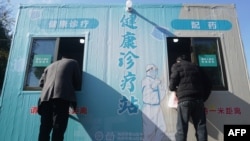The United States on Tuesday offered to share vaccines with China to stem soaring COVID-19 cases, saying containing the outbreak was in the interest of the world.
It is unlikely that China would accept the offer from the United States, its frequent adversary, after Beijing invested heavily in COVID-19 diplomacy that included shipping its homegrown vaccines around the world.
"It's important that all countries focus on getting people vaccinated and making testing and treatment easily available," State Department spokesman Ned Price told reporters.
"The U.S. is the largest donor of COVID-19 vaccines around the world. We're prepared to continue to support people around the world, including in China, with this and other COVID-related health support," Price said.
"This is profoundly in the interests of the rest of the world. Our COVID-19 vaccines are safe and effective, and we have provided them to countries around the world, regardless or in spite of any political disagreements."
Price said that the caseload in China, the world's second-largest economy, had both human and economic costs.
"It's important not only for the PRC, but also for the continued economic recovery of the international community that the PRC is in a position to get this outbreak under control," he said, referring to the People's Republic of China.
China, where COVID-19 was first detected three years ago, until recently attempted a policy of zero cases that included stringent lockdowns.
The communist leadership abruptly reversed course after rare public protests, but much of the population remains unvaccinated, especially the elderly.
Crematorium workers in China told Agence France-Presse that they are struggling to keep up with a surge in deaths.
China's homegrown Sinopharm vaccine has an efficacy rate of 79% against symptoms and hospitalization after two doses, the World Health Organization said in June, compared with around 95% for U.S.-made Moderna and Pfizer.




